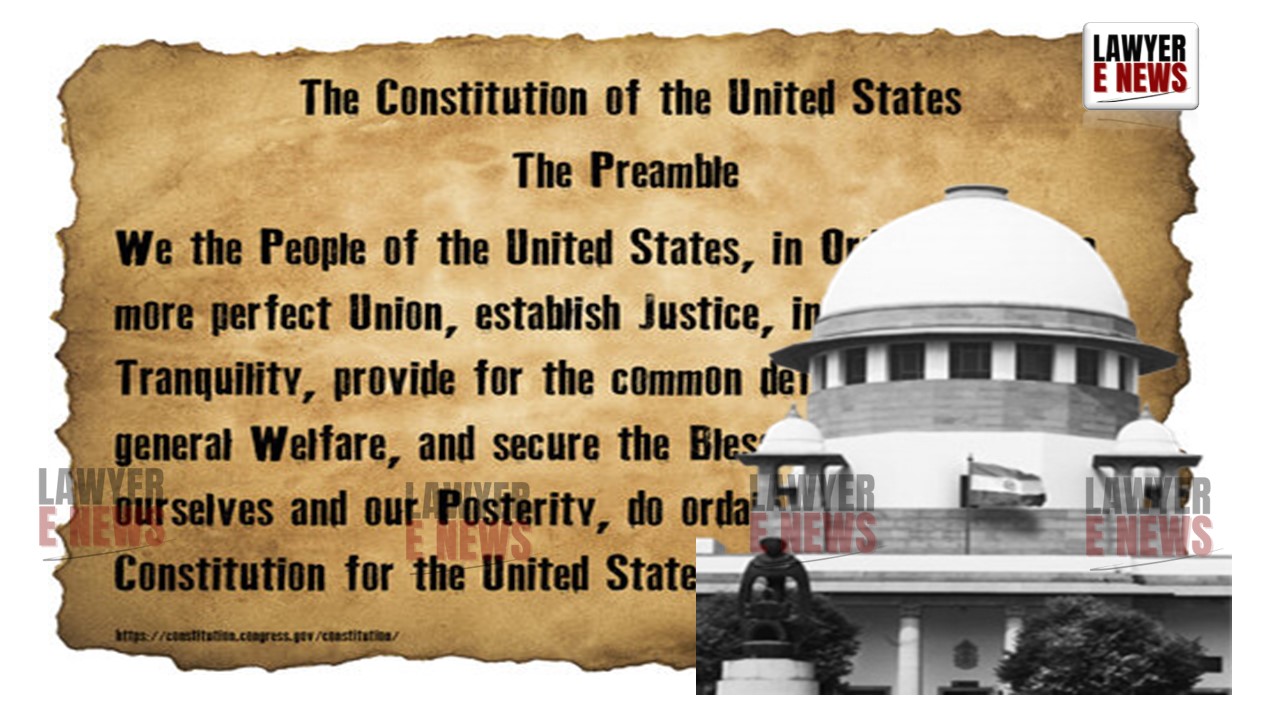-
by Admin
15 February 2026 5:35 AM



Today, On October 21, 2024, the Supreme Court of India reiterated that secularism is a core feature of the Indian Constitution, emphasizing that the terms "socialist" and "secular" in the Preamble should not be interpreted solely through a Western perspective. The Court was hearing petitions challenging the insertion of these terms in the Preamble by way of the 42nd Constitutional Amendment.
A bench of Justices Sanjiv Khanna and PV Sanjay Kumar noted that while these terms were added to the Preamble in 1976, during the Emergency, their interpretation could be distinct within the Indian socio-political context. The Court agreed to examine certain constitutional arguments raised by the petitioners, particularly around the legitimacy of applying these terms to the original Preamble of 1949.
"Socialism and Secularism Should Not Be Limited to Western Interpretations"
During the hearing, Justice Khanna observed, "Socialism can also mean there has to be fair opportunity for all—a concept of equality. Let's not take it in a Western concept. It can have some different meaning as well. Same with the word secularism." The Court underscored that Indian socialism is not necessarily aligned with its Western counterpart and focuses on creating equitable opportunities for all citizens.
However, the Court declined to issue a formal notice to the central government on the matter but agreed to further examine the legal issues raised by one of the petitioners, BJP leader Subramanian Swamy, who argued that the terms “socialist” and “secular” added in 1976 should not retroactively apply to the original Preamble framed in 1949.
The case originated from multiple petitions challenging the constitutionality of the 42nd Constitutional Amendment, which added the terms "socialist" and "secular" to the Indian Constitution's Preamble. One of the primary petitioners, BJP leader Subramanian Swamy, argued that the amended Preamble wrongly bears the date of November 26, 1949, the day the original Preamble was adopted by the Constituent Assembly.
Swamy and the other petitioners, including advocates Vishnu Shankar Jain and Ashwini Kumar Upadhyay, argued that these terms were inserted into the Preamble without public debate or parliamentary discussion during the Emergency period. They claimed that this amendment goes against the vision of the Constitution’s framers, who had purposefully chosen not to include the terms "socialist" and "secular" in the original text.
The petitioners also raised concerns over the Representation of the People Act, 1951, which requires political parties to commit to upholding secularism as a condition for registration. Advocate Upadhyay argued that this provision infringes on political freedom and should be struck down.
The key legal question presented before the Court revolves around the legitimacy and implications of the 42nd Amendment and whether the insertion of "socialist" and "secular" into the Preamble aligns with the original constitutional vision. The petitioners argued that these concepts, though relevant, should not have been added without a broader democratic debate, particularly during a time of national Emergency.
One of the petitioners, advocate Vishnu Shankar Jain, contended, “This was not debated in the Parliament. It is against the founding fathers’ idea. Lordships, please allow us to raise this issue.”
Justice Khanna responded sharply, asking, "You don’t want India to be secular?" Jain clarified, "We are not saying that India is not secular. We are challenging this amendment."
The Court reminded the petitioners that the framers of the Constitution had always intended for India to be secular, citing the Articles under Part III of the Constitution, which emphasize equality and religious freedom. Justice Khanna pointed out, “If one looks at the right to equality and the word fraternity used in the Constitution, as well as the rights under Part III, there is a clear indication that secularism has been held as a core feature of the Constitution.”
“For Socialism, We Have Not Followed the Western Concept”: Supreme Court
Addressing the concerns over socialism, the Court clarified that India’s adoption of socialism was different from Western interpretations. Justice Khanna noted, "For socialism, we have not followed the Western concept, and we are happy with it." The Indian approach to socialism, according to the Court, focuses more on creating equitable opportunities and social justice rather than the rigid, state-controlled economic systems seen in Western socialist models.
Advocate Jain argued that Dr. BR Ambedkar had opposed the inclusion of socialism during the Constituent Assembly Debates, fearing it could curtail individual liberty. In response, Justice Khanna questioned whether liberty had been curtailed in practice due to the inclusion of the term "socialism."
Subramanian Swamy raised a unique argument, contending that the amended Preamble inaccurately bears the date of November 26, 1949, when the original Constitution was adopted. He argued that the terms "socialist" and "secular," added in 1976, should not be linked to the original date, as they were not part of the founding document.
Swamy suggested the possibility of splitting the Preamble into two parts—one reflecting the original Preamble of 1949 and the other acknowledging the amendments introduced later. "It is wrong to say that we, the people of India, consented to the enactment of words 'secularism' and 'socialist' in 1949," he argued.
While the Court agreed to review this argument, it refused to issue a formal notice to the central government. The bench posted the case for further hearing in November.
The Supreme Court's observations reaffirm the significance of secularism and socialism within the Indian constitutional framework but underscore the need to interpret these concepts in a manner that is sensitive to India’s unique socio-political realities. The case will continue to be heard in November, with the Court set to delve deeper into the constitutional validity of the 42nd Amendment and its impact on the Preamble.
Next Hearing In November 2024
